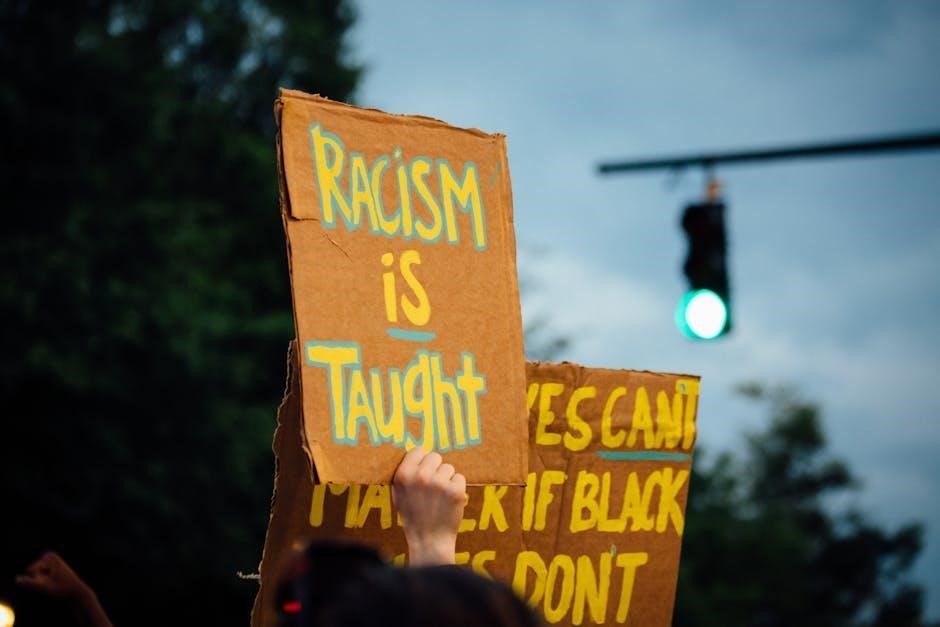
Michael J. Sandel’s Justice: What’s the Right Thing to Do? explores moral and ethical dilemmas through real-world examples, inspiring readers to rethink their understanding of justice.
Overview of the Book by Michael J. Sandel
Michael J. Sandel’s Justice: What’s the Right Thing to Do? is a compelling exploration of moral philosophy, drawing on real-world dilemmas to examine theories of justice. Based on his renowned Harvard course, the book challenges readers to critically evaluate concepts like utilitarianism, Kant’s categorical imperative, and Rawls’ “justice as fairness.” Sandel uses engaging examples, such as price-gouging and military conscription, to illustrate how justice applies in everyday life. His accessible approach makes complex philosophical ideas relatable, encouraging readers to reflect on morality, rights, and the common good. The book has been widely acclaimed for its clarity and depth.
The Central Question: Defining Justice
At the heart of Michael Sandel’s Justice: What’s the Right Thing to Do? lies a profound inquiry into the nature of justice. Sandel argues that justice is not merely a philosophical abstraction but a living, breathing concept that shapes human interactions; He challenges readers to move beyond superficial notions of fairness and equality, exploring how justice intersects with morality, rights, and the common good. Sandel’s central question—What is the right thing to do?—invites readers to grapple with ethical dilemmas in both personal and societal contexts. Through this exploration, he reveals the complexity and depth of justice as a guiding principle for human life.
Theories of Justice Explored in the Book
Utilitarianism, Kant’s Categorical Imperative, John Rawls’ Justice as Fairness, and Virtue Ethics are critically examined. Sandel explores their strengths and weaknesses in defining justice.
Utilitarianism: Maximizing Welfare
Utilitarianism, as explored by Sandel, focuses on maximizing overall happiness and minimizing suffering. Jeremy Bentham’s version emphasizes pleasure and pain, while John Stuart Mill refines it with the “greatest happiness principle.” Sandel critiques Bentham’s approach as overly simplistic, arguing that it neglects individual rights and moral complexities. He questions whether maximizing welfare alone can truly define justice, using examples like price-gouging to highlight ethical dilemmas within this framework. Sandel’s analysis challenges readers to consider the limitations of utilitarianism in addressing moral and social inequalities.
Kant’s Categorical Imperative
Immanuel Kant’s moral philosophy, as discussed by Sandel, centers on the Categorical Imperative, which urges individuals to act only according to maxims that could be universally applied. Kant argues that moral actions are those that align with reason, not emotion or consequence. Sandel examines Kant’s principle, highlighting its emphasis on respect for human dignity and moral duty. However, he also critiques its rigidity, questioning whether it always leads to just outcomes in complex real-world scenarios, such as lying to protect someone from harm. This reflects Sandel’s broader exploration of moral absolutism versus flexibility.

John Rawls and “Justice as Fairness”
John Rawls’ theory of “justice as fairness” posits that societal structures should be designed to benefit the least advantaged. Sandel explains Rawls’ concept of the “original position,” where individuals, behind a “veil of ignorance,” would agree on principles of justice without knowing their personal circumstances. Rawls’ two principles of justice emphasize equal basic liberties and fair equality of opportunity. Sandel critiques Rawls’ approach, arguing it prioritizes redistribution over moral and civic virtues, leading to a society focused on material equality rather than shared moral values.
Virtue Ethics and the Role of Virtues
Sandel examines virtue ethics, which emphasizes the development of good character and moral virtues as the foundation of justice. Drawing on Aristotle’s ideas, Sandel argues that virtues like honesty, compassion, and fairness shape just actions. Virtue ethics shifts focus from rules or outcomes to the moral qualities of individuals, advocating for a society that cultivates these traits. Sandel highlights how this approach contrasts with utilitarianism and Kantian theories, offering a distinct perspective on achieving a just and harmonious society through ethical character development.

Real-World Applications of Justice
Sandel explores real-world ethical dilemmas, such as price-gouging, military conscription, and the balance of liberty, equality, and rights, applying theoretical concepts to practical societal challenges and debates.
Price-Gouging Debate: A Case Study
The price-gouging debate, as explored in Sandel’s work, examines the moral implications of inflating prices during crises. Sandel challenges readers to consider whether such practices are unfair or merely reflections of market forces. He discusses how utilitarianism might justify price-gouging if it maximizes overall welfare, while Kantian ethics would condemn it for exploiting desperation. This case study highlights the tension between economic freedom and moral responsibility, urging readers to question the ethics of profit in times of need.
Military Conscription and Patriotism
Sandel examines the moral dimensions of military conscription, questioning whether it aligns with patriotism or infringes upon individual rights. He explores the tension between civic duty and personal freedom, arguing that conscription challenges the balance between collective responsibility and individual autonomy. Sandel also discusses how different theories of justice, such as utilitarianism and Kantian ethics, approach this issue, offering a nuanced analysis of its ethical complexities.
Liberty, Equality, and Rights
Sandel delves into the interplay between liberty, equality, and rights, questioning how these concepts interact in a just society. He critiques the notion that liberty and equality are always in conflict, arguing that true justice requires balancing individual freedoms with collective well-being. Drawing on real-world examples, Sandel explores how rights-based theories often overlook the importance of community and shared moral values in achieving genuine equality and freedom for all.

Sandel’s Contributions to Modern Thought
Sandel challenges liberalism by emphasizing community and moral values over individualism, reviving republican ideals and reshaping contemporary debates on justice and ethics.
Critique of Liberalism
Sandel challenges the primacy of individual rights and self-interest in liberal thought, arguing that liberalism neglects the importance of community, moral values, and shared goods. He contends that liberal theories, particularly those of John Rawls, oversimplify justice by focusing solely on procedural fairness. Sandel advocates for a more nuanced approach, emphasizing the need to engage with substantive moral and spiritual questions in politics. His critique highlights the limitations of liberalism in addressing issues of solidarity and the common good, offering a compelling alternative perspective.
Revival of Republican Political Tradition
Sandel’s work revives the republican tradition, emphasizing civic virtue and the common good over individualism. He draws on thinkers like Aristotle and civic republicans, advocating for a politics that prioritizes shared moral values and collective responsibility. This approach contrasts with liberalism’s focus on individual rights, offering a framework where justice is rooted in community and ethical practices. Sandel’s revival of republicanism encourages a reimagining of democracy, where citizens actively engage in shaping a just and virtuous society.
Themes and Moral Dilemmas
The book explores themes of morality, markets, and societal norms, challenging readers to confront ethical dilemmas in politics, economics, and personal life.
Morality in Politics
Michael Sandel examines the role of moral values in political life, arguing that justice involves balancing consequences and principles. He challenges readers to critically evaluate policies and laws, emphasizing the importance of ethical reasoning in governance. Sandel uses real-world scenarios to illustrate how moral dilemmas shape political decisions, encouraging readers to engage deeply with questions of justice and equality. His approach fosters a nuanced understanding of how morality intersects with public policy and societal norms.
The Role of Markets in Society
Michael Sandel critiques the expansion of market forces into realms traditionally governed by moral and civic values, such as healthcare, education, and family life. He argues that allowing markets to define societal values undermines fairness and equality. Sandel challenges readers to question where markets should operate and how they shape moral judgment. His analysis highlights the tension between economic efficiency and ethical considerations, urging a deeper reflection on the appropriate role of markets in fostering a just society.
Educational Impact and Reception
Michael Sandel’s Justice course at Harvard, attended by thousands, and its PBS adaptation, have made complex theories accessible, ensuring its widespread educational and public impact globally.
Harvard’s Popular “Justice” Course
Michael J. Sandel’s “Justice” course at Harvard University has become a landmark in education, attracting over 15,000 students. Its engaging format, using real-world dilemmas and interactive discussions, fosters critical thinking. The course’s popularity led to a PBS series adaptation, extending its reach beyond the classroom. Sandel’s ability to make complex philosophical concepts accessible has made the course a global phenomenon, inspiring students and audiences to explore justice, morality, and ethical decision-making in a deeper, more reflective way.
Adaptation into a PBS Series
The PBS series adaptation of Sandel’s “Justice” course brought his teachings to a broader audience. It captured the essence of his Harvard lectures, featuring thought-provoking discussions and real-life moral dilemmas. The series sparked national conversations, making philosophy accessible to millions. By translating complex ideas into engaging content, Sandel’s series became a trusted resource for exploring justice, ethics, and morality beyond the academic realm, reaching viewers of all backgrounds and fostering a deeper understanding of ethical decision-making in everyday life.

Critical Analysis
Sandel’s critique of liberalism and his revival of republican ideals have sparked debate. While his approach is praised for clarity, some argue it oversimplifies complex moral dilemmas.
Strengths of Sandel’s Approach
Sandel’s approach is notable for its accessibility and engaging style. By using real-world examples and moral dilemmas, he makes complex philosophical concepts relatable to a broad audience. His ability to present multiple theories of justice—such as utilitarianism, Kant’s categorical imperative, and Rawls’ “justice as fairness”—with clarity and impartiality allows readers to explore different perspectives critically. This method fosters deeper understanding and encourages readers to form their own conclusions about justice.
Weaknesses and Criticisms
Some critics argue that Sandel’s approach, while engaging, lacks depth in its exploration of certain philosophical theories. His reliance on real-world examples, while accessible, may oversimplify complex ethical dilemmas. Additionally, Sandel’s critique of liberalism has drawn criticism from scholars who argue that his rejection of liberal principles overlooks their potential to address inequality and protect individual rights. Despite these criticisms, Sandel’s work remains widely praised for its ability to provoke critical thinking and public discourse on morality and justice.
Michael Sandel’s Justice: What’s the Right Thing to Do? challenges readers to reflect on morality, encouraging a deeper engagement with ethical dilemmas in everyday life.

Final Thoughts on Justice and Morality
In Justice: What’s the Right Thing to Do?, Michael Sandel invites readers to grapple with moral dilemmas, emphasizing the need to balance individual rights with the common good. His exploration of justice, rooted in real-world scenarios, challenges us to think critically about morality in politics and society. By blending philosophical theories with everyday examples, Sandel encourages a deeper reflection on ethical decision-making. His work underscores the importance of understanding justice as a dynamic concept shaped by history, culture, and human values, making it a timeless guide for navigating complex moral landscapes.

References and Further Reading
For deeper insights, explore Michael J. Sandel’s Justice: What’s the Right Thing to Do? (Farrar, Straus and Giroux, 2009). His Harvard course, also titled “Justice,” is available as a PBS series; Further reading includes Sandel’s other works like What Money Can’t Buy. The book is widely available in PDF and paperback formats, with ISBN 978-0141041339. Readers can find it on platforms like Amazon, Google Books, and academic databases for continued exploration of justice and morality.